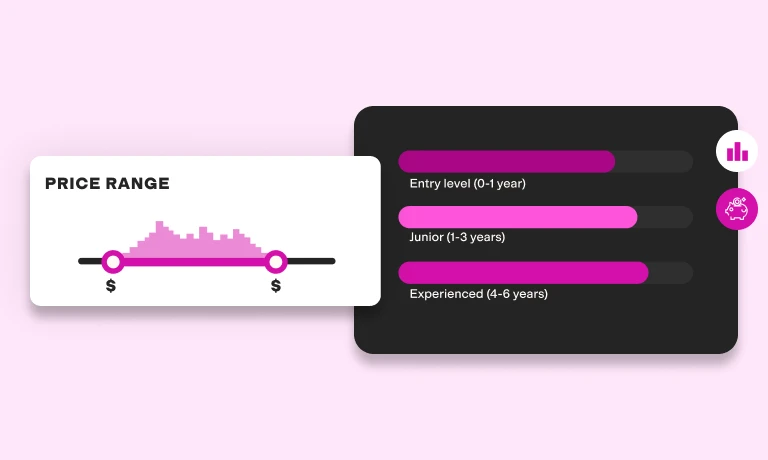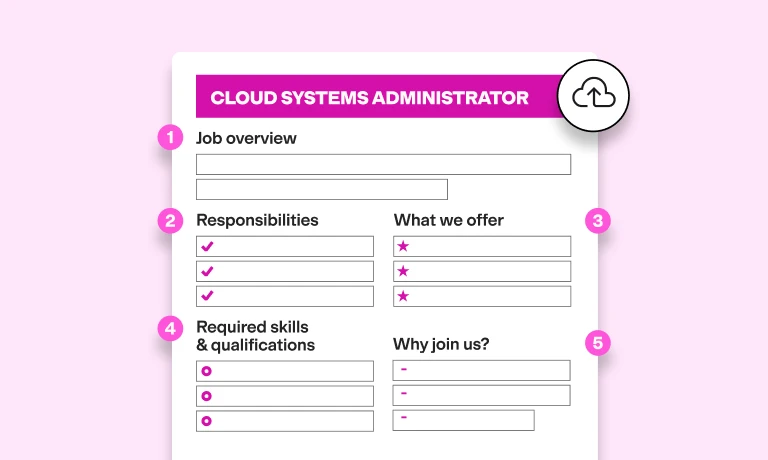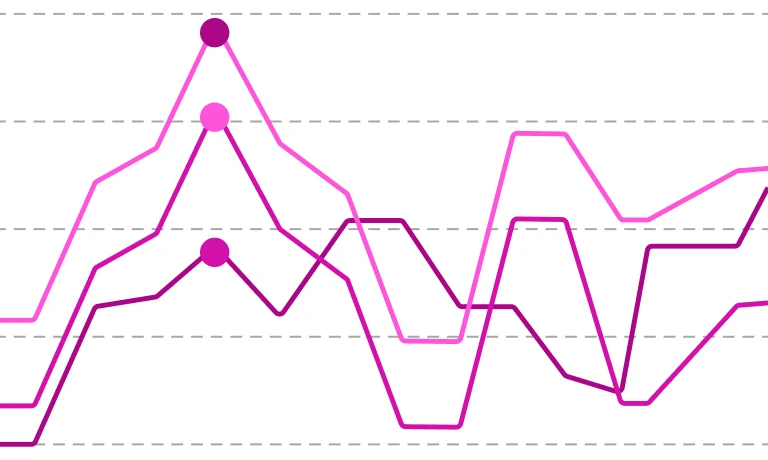30 tech behavioral interview questions (+ answers to look for)
With so many IT skills and proficiencies to consider and evaluate, interviewing for tech roles can sometimes be challenging. It’s tough to find candidates with the right balance of tech and interpersonal skills who will work well in your team. You must carefully gauge candidates' technical acumen, soft skills, and ability to adapt to your company’s culture.
Behavioral interview questions provide insights into your applicant’s experiences and can be used to predict future performance. You can assess a candidate’s ability to adapt to fast-paced tech environments, work in a team, and solve complex problems.
We’ve compiled 30 tech behavioral interview questions so you can make great IT-hiring decisions, finding the perfect fit for your tech team.
What are behavioral interview questions?
Behavioral interview questions focus on how a candidate has acted in specific situations in the past. They’re designed to get an insight into how a candidate handles different scenarios and problems.
For tech roles, these questions might relate to how a candidate has dealt with tight deadlines, managed a complex project, or resolved conflict within a team.
Why ask behavioral questions during a tech interview?
There are several reasons to ask behavioral questions during a tech interview.
Gauge problem-solving skills: Tech roles often involve solving complex problems. By asking about past experiences, you can see how a candidate thinks and how they approach challenges.
Assess teamwork and communication: Tech roles usually require collaboration. Behavioral questions can help you understand a candidate’s communication style and how they work in a team.
Determine cultural fit: Behavioral questions can give you a glimpse into a candidate’s values and whether they align with your company culture.
Evaluate adaptability: The tech industry changes rapidly. By asking about a candidate’s experience, you can see how they adapt to new situations and technologies.
Prevent mis-hires: With a well-rounded picture of your candidate’s skills and behaviors, you’re less likely to make a poor hiring decision, reducing employee turnover and saving costs.
The best insights on HR and recruitment, delivered to your inbox.
Biweekly updates. No spam. Unsubscribe any time.
30 behavioral interview questions for tech roles and answers to look for
It's clear that behavioral interview questions can help you evaluate your tech candidates’ personalities and individual approaches.
We've split 30 of the best behavioral questions for tech roles into 10 sections below. Use these as a starting point, incorporating questions that are more specific to your company and role.
Communication behavior questions for tech roles
Effective communication is vital in a tech role. Whether discussing complex systems with colleagues, translating technical terms to non-technical staff, or presenting findings, precise communication can make a significant difference.
Look for candidates who can convey complex ideas clearly, demonstrate active listening, and show empathy in their interactions.
Here are three tech behavioral interview questions for evaluating communication:
Can you explain a complex technical issue you had to explain to a non-technical person? How did you ensure they understood it?
How have you handled giving feedback to a team member who made a mistake?
Tell me about a time when your ability to communicate had a significant impact on a project.
Problem-solving behavior questions for tech roles
Tech roles are filled with problem-solving moments, so having a candidate who thrives in these situations can set your team up for success.
When assessing a candidate’s problem-solving skills, these tech behavioral interview questions work well:
Describe when you faced a technical problem you couldn’t solve immediately. What steps did you take to find a solution?
Can you share a time when you used a unique or creative solution to fix a tech issue?
How have you handled a situation where you were under a lot of pressure to solve a technical problem?
Seek out individuals who are comfortable tackling unknown problems, can break down complex issues into manageable tasks, and exhibit a consistent approach to problem-solving.
Teamwork behavior questions for tech roles
A team’s ability to collaborate effectively can often make the difference between a successful project and a failed one. In tech roles, teamwork involves communication, conflict resolution, knowledge-sharing, and collaboration.
Here are three tech behavioral interview questions you can use to assess teamwork:
Describe a time when you had to collaborate with a colleague who had a different approach to problem-solving. How did you handle it?
Can you share an instance where your team faced a significant technical problem? How did you contribute to the solution?
Tell me about a time when you helped a team member understand a complex technical concept. How did you go about it?
Look for people who can work with colleagues with differing problem-solving approaches, and who demonstrate the flexibility and willingness to find common ground.
Those who show they can adapt to diverse perspectives, contribute to problem-solving, and effectively share knowledge within a collaborative setting are good candidates to join your team.
Critical thinking behavior questions for tech roles
Critical thinking is the ability to analyze information objectively and make reasoned judgments. In IT, critical thinking can mean the difference between creating robust, efficient solutions and producing error-prone or inefficient systems.
Listed below are three tech behavioral interview questions formulated to gauge critical thinking:
Can you share an example of a technical project where you had to make a critical decision? How did you evaluate your options?
Tell me about a time when you had to analyze a complex data set. How did you approach it, and what was the outcome?
How have you balanced the need for innovation and creativity with the practical constraints of a project?
Look for candidates who can analyze and interpret complex information, evaluate different solutions, and make informed decisions.
Adaptability behavior questions for tech roles
The tech industry is known for its fast-paced and ever-evolving nature. Therefore, adaptability is an essential trait in a tech candidate. You’ll want candidates who can cope with changing circumstances, embrace new tools and technologies, and continually learn and grow.
Here are three interview questions you can use to find candidates with these traits:
How have you adapted to a significant change at work, such as new software or a change in team structure?
Can you share a time when a project did not go as planned and you had to change your approach midway?
How do you keep yourself updated with the latest advancements in your field?
Time management behavior questions for tech roles
Tech jobs often involve handling multiple tasks at the same time. Prioritization, organizing work, meeting deadlines, and balancing quality with speed are essential skills.
Use the following tech behavioral questions to identify these abilities:
Describe a time when you had to juggle multiple tasks at once. How did you ensure everything got done?
Can you tell me about a time when a project’s deadline changed suddenly? How did you adjust your plans?
Give an example of a tool or method you use to manage your time when working on a technical project.
For these questions, look for candidates who can show an understanding of prioritization and effective use of tools to manage time.
Stress management behavior questions for tech roles
Tech professionals often face high-pressure situations, tight deadlines, and complex problems that require calm and composed responses. Identifying how a candidate handles stress can help you predict their performance under pressure.
To explore stress management skills in candidates, consider asking these three behavioral interview questions:
Tell me about a time when you had to work under a lot of pressure. What was going on, and how did you handle it?
Describe a time when a tech project didn’t go as planned. How did you manage your stress?
When working on a challenging tech project, what strategies do you use to manage stress?
Look for answers that show self-awareness, resilience, and effective stress-coping strategies, like taking a break, asking for help, or using stress-management techniques.
Empathy behavior questions for tech roles
The ability to understand and share the feelings of others is vital in tech roles. It helps in understanding user needs, collaborating with team members, and providing effective solutions. Assessing a candidate’s empathy can give you an idea of their interpersonal skills.
You can test candidates’ empathetic qualities with questions like these:
Describe a time when you had to explain a technical issue to a non-technical person. How did you ensure they understood?
Can you share an example of when you considered user feelings or feedback in your tech solution?
Tell me about a time you disagreed with a team member. How did you handle the situation?
Choose candidates who demonstrate active listening, patience, and a desire to understand and help others.
Decision-making behavior questions for tech roles
Tech professionals must often make quick decisions, weigh various options, and assess risks. A candidate’s decision-making process can offer insights into their problem-solving skills and judgment.
Here are three tech behavioral interview questions to evaluate decision-making:
Describe a tough decision you had to make on a tech project. What factors did you consider, and what was the outcome?
Tell me about a time when you had to make a quick decision on a tech issue. How did you ensure it was the right choice?
Can you share an example of a decision you made that involved a risk? How did you assess and manage that risk?
The ideal responses to these questions will indicate a logical approach to decision-making, considering all relevant information and managing potential risks.
Self-improvement behavior questions for tech roles
The technology sector is constantly evolving, with new programming languages, tools, and frameworks regularly appearing.
Candidates committed to continual learning and skill development are more likely to thrive in this fast-paced industry. Self-improvement also shows a level of curiosity and passion for the field – traits that can fuel innovation.
Tech behavioral interview questions to assess self-improvement include:
Can you tell me about a recent tech skill you’ve learned or improved? How did you go about it, and how have you applied it to your work?
Technology is constantly evolving. How do you keep your tech skills up to date?
Tell me about a time when you struggled with a tech project. What steps did you take to overcome it?
Ideal answers should include recent tech skill improvements, the learning process used, and how they applied those skills at work.
How to roll out tech behavioral interviews
Tech behavioral interviews can be decisive in a comprehensive candidate screening process. It’s important to remember that these interviews should complement other metrics to ensure you are looking at the whole candidate.
With TestGorilla, you can access a range of tests specifically tailored for evaluating tech professionals. Depending on the tech role in question, you can add software skills assessments such as an Excel skills test or a WordPress Developer test.
TestGorilla also has more than 100 programming skills tests, ranging from AJAX to Ruby on Rails tests. By combining technical assessments with behavioral interviews, TestGorilla provides a holistic view of a candidate's skills and suitability for the role.
Here’s how you can effectively use TestGorilla to roll out tech behavioral interviews.
Evaluate candidate experiences objectively: We suggest performing pre-interview testing. A well-rounded prescreening assessment process can help you understand the different aspects of a candidate’s experience without bias.
Leverage TestGorilla’s test library: The platform has an extensive library of more than 320 scientifically validated tests, including various tech-specific assessments.
Use personality tests: Tests like DISC and Big 5 (OCEAN) are available through TestGorilla’s platform, which can help you evaluate a candidate’s potential fit into your company culture.
Customize your assessment: With the ability to add custom questions, you can tailor your assessment to fit your unique business needs. This can include adding specific behavioral questions you want to ask every candidate.
Use one-way interviews: TestGorilla’s one-way interviews enable candidates to respond to your preset interview prompts at a time and location convenient for them. You can then review these responses when it suits you.
Combine tech skills tests, behavioral, and personality insights: TestGorilla will give you a comprehensive report on each aspect of your tech candidate’s performance, resulting in a well-rounded assessment.
Conclusion
Tech behavioral interview questions offer a window into a candidate’s personality, behaviors, and alignment with your company culture. They complement technical interview questions and skill assessments, providing a fuller picture of each candidate’s potential fit within your team.
While these tools offer valuable insights, they shouldn’t be used in isolation to make hiring decisions. Instead, they should be part of a larger puzzle, giving you a deeper understanding of each candidate.
TestGorilla’s platform offers a wealth of tools to assist with this process. Its vast test library, customizable assessments, and one-way interviews can help you create a robust and fair selection process. Detailed reports also provide insights into each candidate, enabling you to create personalized behavioral interview questions.
If you’re eager to see how TestGorilla can support your hiring process, why not sign up for TestGorilla’s Free plan?
You can explore the platform at your own pace or opt for a product tour or free 30-minute live demo and learn more about TestGorilla’s features and how you can streamline your hiring process.
You've scrolled this far
Why not try TestGorilla for free, and see what happens when you put skills first.




















